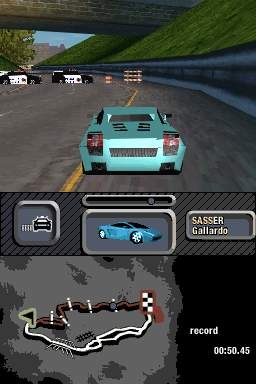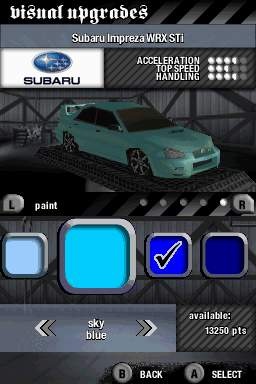Compared to its console counterpart, the Nintendo DS version of Need for Speed Most Wanted is far less ambitious, and in turn, not as interesting. It's basically just another generic racing game with a few police cars mixed in among the competitors. Furthermore, there are problems with the game's controls, physics, and artificial intelligence, which often make the process of playing the game more frustrating than fun.

The first things to hit the cutting-room floor were the console game's story and cinematic video scenes. The development team didn't even try to duplicate these features with, perhaps, still screens and text--a mild shame considering the dialogue in the console game is so corny that it's actually lovable. The open-ended city was axed too. Taken together, these cutbacks mean that the DS version is organized primarily as a collection of menus that let you choose individual events in the game's quickplay, career, and two-player Wi-Fi modes. Race types include the standard point-to-point, circuit, and time trial events, which are part and parcel of any racing game, as well as an event that's unique to Most Wanted called "barricade." In this event, you have to try to drive through a series of police barricades without running into the cars and vans holding the wooden crossbeams.
Despite the addition of police to the mix, avoiding the cops in non-barricade events isn't too difficult, primarily because there really aren't that many of them. Unlike in the console game, which constantly ramps up the law enforcement's numbers until you're being chased by dozens of cop cars and a police helicopter, you'll only find yourself being followed by as many as two police cars at any given time in the DS version. They'll give chase when your car's "heat level" is high enough. Heat level is an indicator of your wanted status and is increased by bumping into other cars, trashing street signs, and speeding past police cruisers. When your heat level is maxed out, the police try to knock you off the road or lay down a spike strip ahead of you. If you finish a race with your heat level filled, you can also challenge the cops to a double down race, which gives you the chance to wager that event's earnings on a one-lap face off. Ironically, should you happen to get busted, the only punishment you'll face is the few seconds you'll lose getting back up to speed in the race. You can also "get out" of the bust by participating in one of two minigames, either four-card monte or a tire-spinning contest. Both minigames use the touch screen. That's the full extent of the so-called police presence in the DS version.
The racing itself is generic and plain, which wouldn't be so bad except that there are also various problems that crop up frequently to inject needless frustration into the game. Most events place you with three opponents out on the course, along with a few cops and dozens of innocent commuter vehicles. Each course is a good length, and most have a shortcut or two. The cars, in general, all feel heavy and mostly handle the way they should. You don't have to worry about the nitro boosts or slow-motion cameras that the console and PlayStation Portable versions of the game have, since they weren't implemented in the DS version. You'll want to take first in every race so that you can unlock additional car upgrades and boss challenges, and you'll probably end up replaying some races multiple times in order to do so. Obviously, getting nabbed by the cops or colliding with commuter cars will slow you down, as will nudging into or smacking into walls. Unfortunately, the controls tend to oversteer, so it's easy to smack into cars, walls, and everything else. To make matters worse, the game's collision physics are unforgiving. Run into or rub sides with any other vehicle, opponent or otherwise, and you'll be pushed backward every time. Meanwhile, the CPU can often pass through oncoming traffic and always gets a helpful boost whenever you so much as bump fenders. Needless to say, racing on tight roadways isn't fun.
Also frustrating is the game's AI, which ranges from normal to dimwitted to absolutely unfair, all during the span of a single race. When the AI is functioning as it should, it's tough, but not impossible, to pass opponents and evade cop cars. When it isn't functioning properly, your opinion may vary depending on the outcome. It's not so terrible when an opponent suddenly turns the wrong way for no reason. On the other hand, it absolutely bites when an opponent inexplicably jumps out to a large lead or when oncoming cars start swerving toward you in order to hit you.
Should you attempt to acclimate to the game's flaws, you'll certainly find a healthy amount of content to dig into. The garage includes 15 licensed vehicles, ranging from the lowly VW Golf to the beefy Lamborghini Gallardo, and there are 10 different courses to pick from. Dozens of performance upgrades, body kits, and vinyls can be unlocked by playing through the career mode, which includes 75 events spread throughout 15 chapters.

Just don't plan on showing off the game to your friends, because the graphics, while passable, aren't worth bragging about. Visually speaking, the game has a smooth frame rate and there are enough polygons to go around, although the environments sometimes suffer due to instances of seam tearing and disappearing textures. Commuter cars also have a habit of suddenly appearing on the road a few feet in front of you. Commuter and police vehicle models are extremely basic, but actual competitor vehicles are colorful, shiny, and intricate--right down to flickering taillights and custom body kits. All of the action is shown on the upper screen, while the lower screen is used to display the course map and driver positions.
The audio, meanwhile, is just plain pathetic. Car engines sound like lawn mowers and crashes sound like soup cans being banged together. Instead of using licensed music tracks, the DS version employs the same cheesy elevator music that the Game Boy Advance version has, albeit recorded at a higher quality.
On the whole, the DS version of Need for Speed Most Wanted is a flawed and pale knockoff of its console counterpart. At its best, it's a standard racing game that coincidentally happens to have a few police cars roaming the streets along with the competitors. At its worst, it's downright frustrating.



